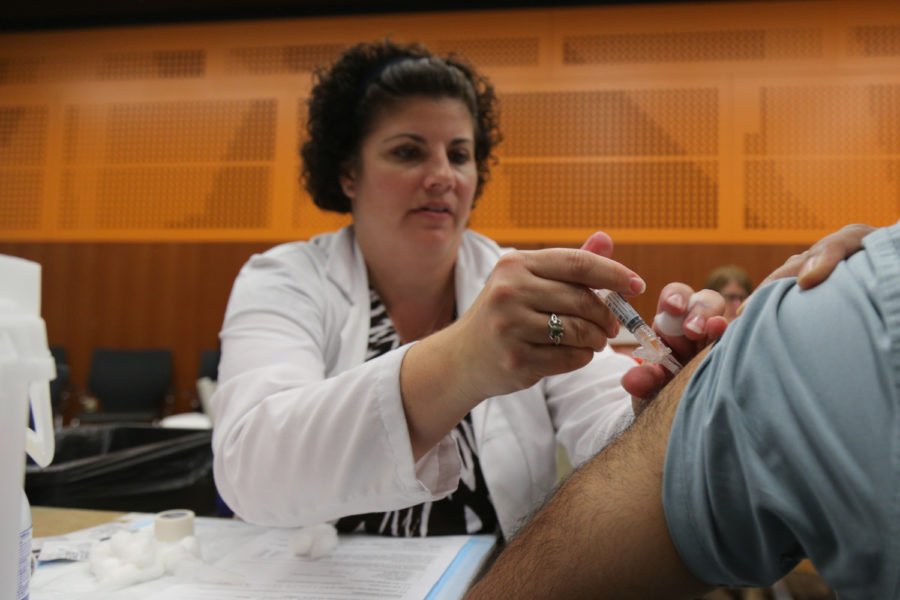Don’t miss your shot to avoid the flu
Theo Schwarz | Senior Staff Photographer
Deanne Hall — an assistant professor in the School of Pharmacy and Therapeutics — works at the Oct. 10 flu shot clinic in Benedum Hall.
November 2, 2018
Temperatures and autumn leaves may be falling as November gets underway, but flu season is on the rise. And for students in densely populated spaces like college classrooms and dorm rooms, it’s especially important to take proactive measures — like getting a flu shot.
In a newly released report from the Centers for Disease Control and Prevention, the Advisory Committee on Immunization Practices made recommendations regarding the best times during the year to get the flu shot. The report recommends receiving trivalent or quadrivalent vaccinations at the latest by the end of October, because the flu usually is not in full force at this point in the season and people’s bodies have time to become immune to the strain after receiving the vaccination. This is in the hope that it protects more people than last year’s round of vaccinations, which was only 36 percent effective.
Dr. Simon Barratt-Boyes, a professor of infectious diseases and microbiology at the University of Pittsburgh, said getting a flu shot would help protect not only the person receiving the shot, but others in their environment too.
“Three members of a household are getting vaccinated, that fourth person in the house is less likely to get the flu than if none of the people were vaccinated,” he said.
Dr. Barratt-Boyes explained the science behind how the virus attacks the body and how it spreads. According to him, the flu virus infects cells by a protein binding to the surface of a cell. To prevent this from happening, an antibody that defends the cell from an infectious outside source neutralizes or blocks the effects of the external sourced. So to be effective, the flu vaccine is used to generate an immune system response to neutralize the effects of the virus.
“So ideally the vaccine will give you immunity to the protein that will bind onto the cells of the
next coming virus,” Dr. Barratt-Boyes said.
He also said students should take the flu shot seriously because there are so many ways to contract the disease — frequent hand-washing and covering the mouth when sneezing and coughing won’t fully protect from the virus.
“The virus will persist to some degree on inanimate objects, like door handles and desks,” Dr. Barratt-Boyes said.
Not only can the flu virus infect people in a variety of ways, but its strain is constantly changing — which means it’s important to get a new flu shot at the beginning of each flu season.
In a report on How The Flu Virus can change, the CDC stated that there are two reasons why a virus changes. The first is called “antigenic drift” and happens because small changes in the genes of the virus happen continually over time as the virus replicates. It also causes an abrupt, major change in the viruses’ proteins that infect humans.
When someone gets the flu, their body should become immune to that exact strain of flu if it comes around again.
“A virus changing, no matter how slight, is called a drift in the strain,” Dr. Barratt-Boyes said.
As flu season comes around each year, it could mean a new strain of the flu or a drift in the previous year’s strain. So although someone may have caught the flu the previous year, their body is only immune to a specific version of the previous strain of the flu, and therefore getting the current year’s shot still has effects of minimizing the risk of catching the flu again.
“You’re supposed to be protected from reinfection from the immune response and memory response you have, the problem is the virus changes all the time, and it changes spontaneously, so even if the same strain circulates next year, it’s still a little bit different,” Dr. Barratt-Boyes said.
According to Dr. Barratt-Boyes, while these percentages don’t seem like terribly good odds, it is better than not taking the vaccine, and having the vaccine could potentially reduce the severity of infection.
“You might get infected, but if you weren’t vaccinated you could perhaps have a worse disease,” Dr. Barratt-Boyes said, referring to the possible levels of severity in contracting the flu.
Although the flu vaccine only prevents infection of the flu less than half the time, sophomore nursing student Joanna Neikirk said that it should not stop individuals from protecting themselves and getting the flu shot.
“Any odds [of not contracting the flu] is better than no odds,” said Neikirk. “By that point [after getting the flu shot] your memory cells have made antibodies and are learning to recognize that [foreign substance].”
But not everyone agrees with Neikirk that vaccination against the flu is necessary. One premise of the anti-vaccination movement claims that the vaccine lacks effectiveness and therefore, may lead to serious side effects with harmful ingredients.
But according to Neikirk and Barratt-Boyes, no one needs to worry about contracting the flu from the flu vaccine.
“The flu is dead in the vaccine form,” Neikirk said, “So it literally cannot make you sick.”
Also, the flu vaccine is comprised of protein, according to Barratt-Boyes — which is incapable of transmitting infection. This makes it exceptionally important for people to receive their flu shot before the initial flu season begins. And it is notably easy for students, Pitt faculty and members of the community to get their flu shot, especially on Pitt’s campus.
“[The flu shot] is so easy to get. It’s free! CVS does clinics, Walgreens does clinics, there are free clinics everywhere,” Neikirk said.
Patrick Hanley, a pharmacist preceptor for the University of Pittsburgh, explained that people do not usually even have to schedule appointments for their flu shot.
“Most pharmacies allow for walk in appointments, where you can just walk in and get it, and we can get you in and out within 15 minutes,” Hanley said.
Dr. Barratt-Boyes said if and when students do get sick, it’s crucial to take time to rest and not stick it out to continue with their normal routine. Someone should not go to work or to class when they have the flu.
“If you are sick, you shouldn’t push through and go to class and work incubating your virus with everybody,” Dr. Barratt-Boyes said.
On top of the numerous pharmacies that surround Pitt’s campus, Pitt itself has a specific place — in the Office of Student Health Services — for students to get vaccinated for the flu.
“Pitt has a free clinic, so if you’re a Pitt student and haven’t gotten it, get your flu shot,” Neikirk said.
The University of Pittsburgh provides free flu shots through Student Health Services in an effort to keep students as healthy as possible. Located in Nordenberg Hall, the Student Health Services is open Mondays and Wednesdays from 8:30 a.m. to 9 p.m., and Tuesdays, Thursdays and Fridays from 8:30 a.m. to 5 p.m. Student Health Center employees will administer the shots to any student with a valid University ID.
Neikirk stressed that in getting the flu shot people are taking a step towards taking care of the individuals around them within their community.
“You’re protecting those people who can’t get it, who are too young to get it, who are too old, for whatever reason, you’re keeping them safe,” Neikirk said.



